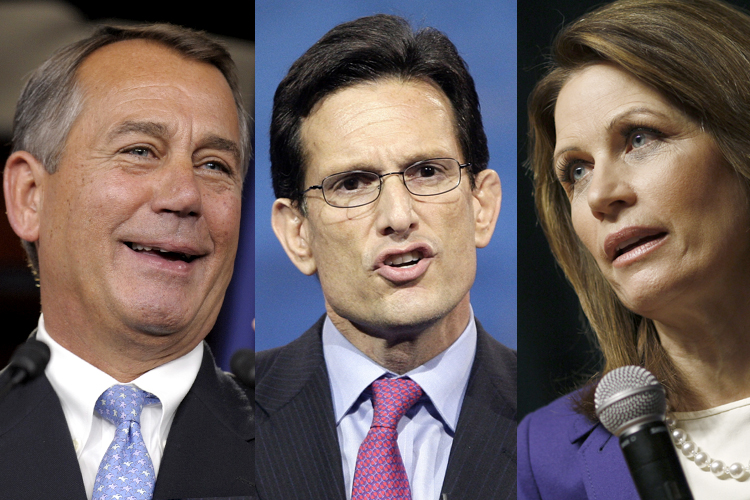Starting on Jan. 1, votes to repeal Obamacare will become votes to take health insurance away from a lot of people. Just how many people will depend on when the votes take place (assuming they take place at all), and when Healthcare.gov is finally up and running. But repeal votes will cease to be abstractions. They’ll be deeply relevant to hundreds of thousands of people. And because politics don’t always obey the laws of entropy, it’s safe to assume that Democrats will characterize past votes for repealing Obamacare as if they’d taken place in 2014.
Which is why the GOP’s latest tactical assault on Obamacare merits so much attention. It underscores how unviable the repeal platform will be by the time Republicans have the power to enact it. And it even suggests repealers have so successfully blinded themselves to the positive consequences of the Affordable Care Act that they can’t see how badly they’re now undermining their own campaign.
Like many other Republican attacks on Obamacare, this one is subterfuge — a proposal that sounds great but in reality would plant the seeds of the law’s destruction. The real goal is to deny Obamacare marketplaces across the country the critical mass and demographic balance they’ll need to function properly. But it’s dressed up in focus-grouped legislation called the Keep Your Health Plan Act.
The Keep Your Health Plan Act clumsily addresses a real moral conundrum created by the failure of Healthcare.gov. The Obama administration timed regulations that have resulted in millions of insurance policy cancellations to coincide with the opening of marketplaces where the people receiving notices could shop for alternatives. But the marketplaces are practically inaccessible in most states. As currently implemented, Obamacare is causing people to lose their existing plans without providing them means to acquire new ones. The Keep Your Health Plan Act would genuinely address this problem, by superseding the administration’s efforts to fix Healthcare.gov.
Republicans are selling it as a fix that will allow people whose insurance policies have been canceled to keep their old plans. In reality it would allow carriers to rescind cancellation notices and honor existing policies outside of the exchanges for another year. That’s easier said than done. It would be a huge logistical challenge. But to the extent that it’s possible, it would create an incentive for insurers to extend only plans for low risk beneficiaries who might be disinclined to enter the new system.
By jumping the gun, though, they’ve revealed that their purpose isn’t to alleviate the bottleneck created by the website, which might still be fixed in time for the administration to keep its end of the bargain.
The timing gives the game away. If it were December, and Healthcare.gov weren’t working, and people whose plans had been canceled were facing the real prospect of a coverage gap, the moral logic of the Keep Your Health Plan Act would be harder to assail.
But House Republicans plan to hold the vote this week, a month ahead of the effective deadline to apply for coverage that begins January 1. And since Republicans aren’t about to stand up and admit that they’re engaging in misdirection and sabotage, they’re left with one plausible argument: that changes in federal healthcare policy shouldn’t cause anyone anywhere to lose health insurance they already have.
But that’s exactly what repealing the ACA would do.
The Keep Your Health Plan Act would be immensely damaging to Obamacare if it ever became law, and preventing it from becoming law will require Senate Democrats and President Obama to sustain real political damage over the next few weeks. But looking ahead, it will be useful for them to have Republicans on the record against forcing people off of their insurance.
Keep Your Health Plan would be consistent with the broader repeal campaign if Obamacare really provided no benefits. And if you’re cocooned in an impenetrable conservative information bubble, it must seem like that’s the case. But, even if you ignore Medicaid, which is expanding on a somewhat distinct path, the law’s already providing tangible benefits to tens of thousands of people. If Healthcare.gov is working in two weeks, that number will swell into the millions.
And at that point the Keep Your Health Plan Act and H.R. 45 (PDF), which passed the House in May, will be incompatible.
If it’s wrong under any circumstances to make changes in law that result in people losing their health insurance, as Republicans are suddenly positing, then the beginning of a new year has no special meaning. There’s no principled distinction between legally rescinding health insurance policies that commenced before Jan. 1 and rescinding health insurance policies that commence after Jan. 1. Unless they let go of their repeal obsession, Republicans will find themselves explicitly in favor of the latter, but not the former.
That won’t fly, particularly so long as the GOP is unable to coalesce around an alternative plan that matches or bests the ACA’s coverage expansion. Obamacare is driving policy cancelations right now, but it at least creates a coverage guarantee for those affected. Repeal without replace would impose a greater burden without providing any counterweight.
If they pass the Keep Your Health Plan Act this week, House Republicans will see their stylized sympathy for people whose policies have been canceled come into tension with their explicit desire to take Obamacare benefits away from many of the same people, and millions more. These conflicting positions underscore why it’s so imperative for the administration to get Healthcare.gov up and running. Once it works, it won’t just serve as a portal connecting the uninsured with decent coverage. It will propel the repeal campaign into its wincing final throes.

